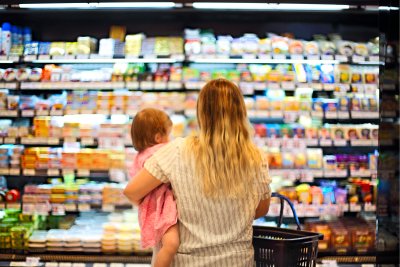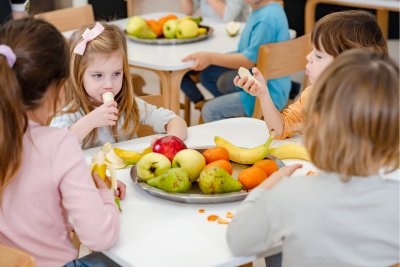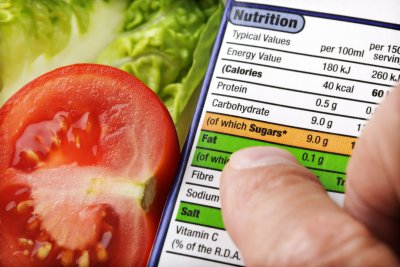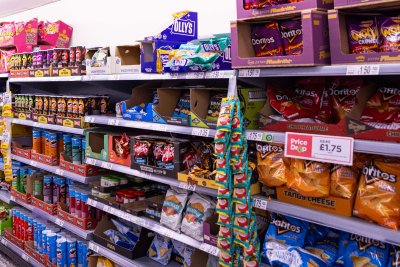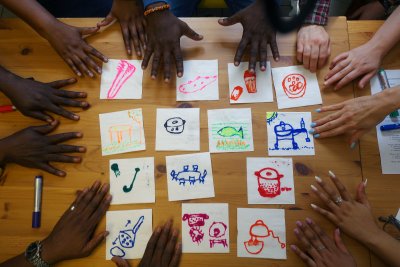 Co-design workshop at community kitchen in Camden. Copyright: Madeleine Kessler
Co-design workshop at community kitchen in Camden. Copyright: Madeleine Kessler
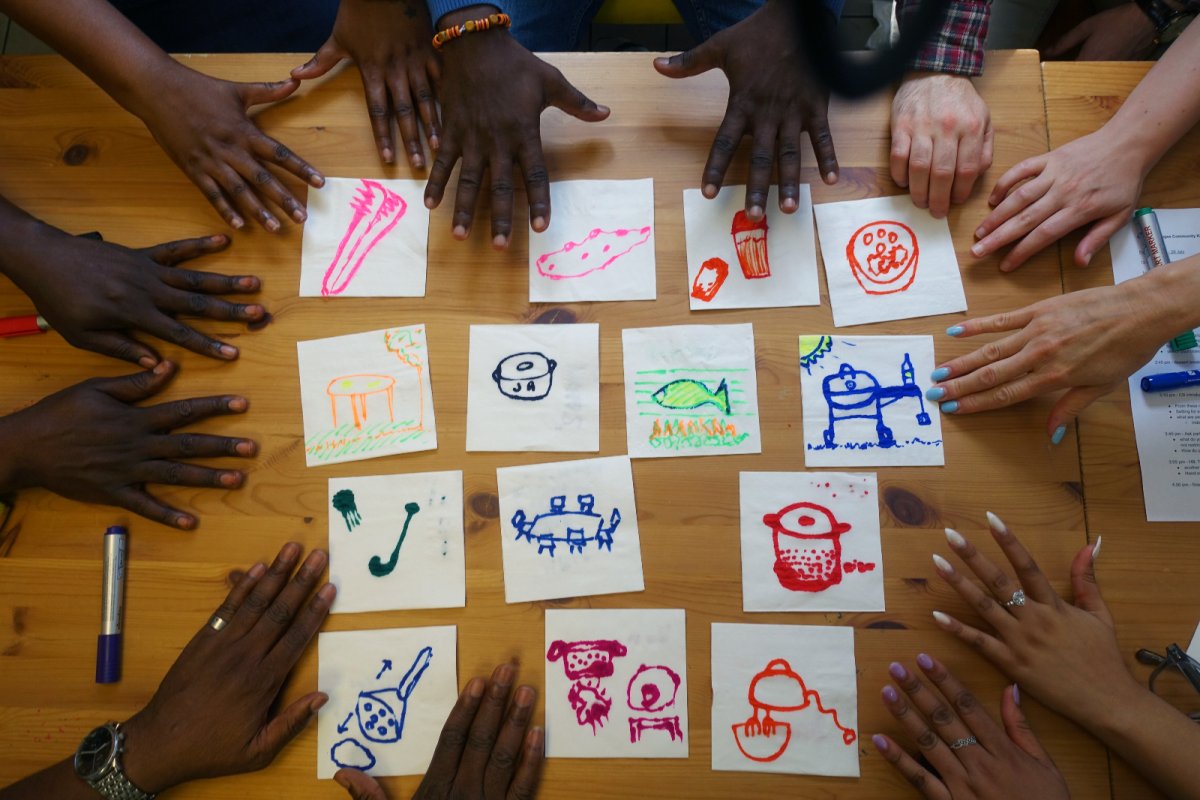
New co-designed community kitchen opens in Camden
An exciting inclusive community kitchen has opened in Camden, following co-design workshops with people seeking asylum alongside long-term local residents.
This new community space officially opened it’s doors on 16 June during Refugee Week, hosting a co-build session and its first shared meal. The Mayor of Camden joined the event to learn about the initative anc connect with those involved. Community members rolled up their sleeves to decorate the venue and cook together, setting the tone for what will now be a welcoming place where people from all walks of life can come together to cook and eat and build stronger community ties.
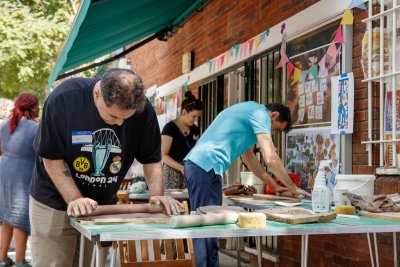
Following recommendations from Sustain’s report ‘Food experiences of people seeking asylum in London: areas for local action’, Camden Council, UCL and partners held co-design workshops between July 2024 and June 2025 with long-term local residents and people seeking asylum to create an inclusive, welcoming community kitchen and meal sharing space in Camden.
Sustain's report highlighted the appalling food experiences many people seeking asylum in London face, including inedible and unsafe food being provided in temporary accommodation, lack of access to kitchen space, and lack of money to purchase ingredients for cooking. People reported experiencing food poisoning, malnutrition and poor mental health as a result of this, which was particularly concerning among children, infants, and people with health conditions, and local authorities working to enable access to community kitchen space was a key recommendation from the report.
The need for community kitchens goes far beyond those seeking asylum, with people housed in temporary or poor accommodation or experiencing homelessness also urgently needing access to adequate kitchen spaces, and for others a community kitchen and meal sharing space offers a range of benefits from learning cooking and nutrition skills, socialising in a welcoming space and being linked up with other support services. The campaign No Child in a Home Without a Kitchen continues to advocate for appropriate accomodation and kitchen spaces to be provided to families.
Researcher Dr Hanna Baumann from the UCL Institute for Global Prosperity, whose work focuses on food justice issues and migrant access to public services, and who collaborated with Sustain on the report, approached Camden Council with the proposal for a pilot ‘public kitchen’. Together they worked with Madeleine Kesseler Architecture, CMTB Works, Somers Town Community Association, and charity FEAST with us (who lead Camden's food partnership) to co-design and activate a public kitchen that local people seeking asylum can use, by renovating the Somers Town Community Association café space.
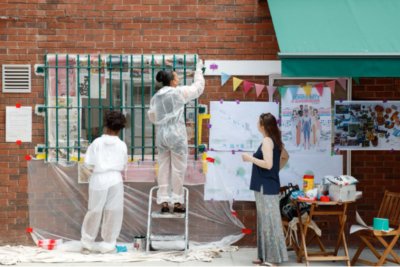
Camden Council’s Food Mission team supplied funds for building materials and labour costs, and UCL’s Bartlett Policy Support Fund supported the co-design process as well as building materials and labour costs. The project also received support from the William Kessler Memorial Trust for activation through cooking workshops, which FEAST with us will provide.
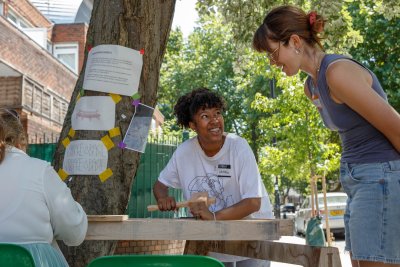
The series of co-design workshops explored what a welcoming and inclusive space would look and feel like, and how it would function, and resulted in the following plans:
- Changing the façade and entrance area of the café, to make it more welcoming and inclusive
- Including co-design elements such as outdoor seating around trees, an awning for shade, a drinking fountain, growing edible plants, welcoming signage, tiled decorative elements, and removing bars from windows and doors
Based on the proposals, the architects proposed a three-phased design to create the space that had been visioned.
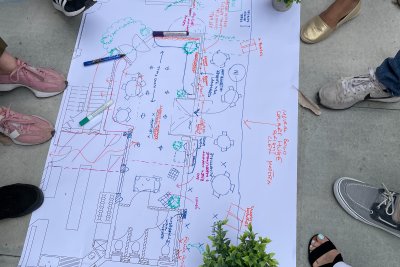
As the ambition of the project grew through the co-briefing process, a multi-phase approach was used to allow the first phase to go ahead at the same time as sourcing further funding for future phases. The project was made possible by architects and other design professionals providing at cost and/or pro bono expertise, and would otherwise require a larger budget. While the launch event brought back the participants who had contributed to the co-design, an additional challenge for the project is that many people seeking asylum who were involved have since been moved out of the borough or city, making it difficult for them to now enjoy the space they helped to design and build. The project sought to maintain their ties to Camden, each other and the project by covering participants travel costs to recurring design and build sessions.
From mid-2025, FEAST with us will run regular, tailored cooking sessions for asylum seekers in the kitchen. The partnership are seeking an organisation that will take over the running of the refugee kitchen sessions from 2026 onwards.
Following the completion of the work, the project leads will share lessons learnt with other local authorities wishing to co-design inclusive communal food sites with different groups living in temporary accommodation or lacking cooking space.
For more information contact Dr Hanna Baumann
Food Poverty: Championing people-powered projects that tackle the root causes of food poverty.
Sustain
The Green House
244-254 Cambridge Heath Road
London E2 9DA
020 3559 6777
sustain@sustainweb.org
Sustain advocates food and agriculture policies and practices that enhance the health and welfare of people and animals, improve the working and living environment, promote equity and enrich society and culture.
© Sustain 2026
Registered charity (no. 1018643)
Data privacy & cookies
Icons by Icons8
